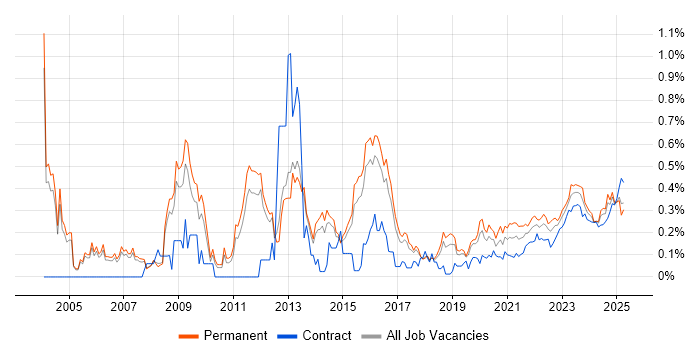Vulnerability Assessment
UK > Work from Home
The table below provides summary statistics and salary benchmarking for remote or hybrid work requiring Vulnerability Assessment skills. It covers permanent job vacancies from the 6 months leading up to 28 February 2026, with comparisons to the same periods in the previous two years.
| 6 months to 28 Feb 2026 |
Same period 2025 | Same period 2024 | |
|---|---|---|---|
| Rank | 359 | 349 | 440 |
| Rank change year-on-year | -10 | +91 | +129 |
| Permanent jobs citing Vulnerability Assessment | 28 | 77 | 98 |
| As % of all permanent jobs with remote/hybrid work options | 0.17% | 0.51% | 0.35% |
| As % of the Processes & Methodologies category | 0.20% | 0.54% | 0.38% |
| Number of salaries quoted | 22 | 39 | 82 |
| 10th Percentile | £47,500 | £37,716 | £37,500 |
| 25th Percentile | £48,165 | £39,858 | £44,063 |
| Median annual salary (50th Percentile) | £52,500 | £55,000 | £60,000 |
| Median % change year-on-year | -4.55% | -8.33% | -4.00% |
| 75th Percentile | £58,250 | £92,000 | £75,000 |
| 90th Percentile | £70,000 | £92,600 | £88,750 |
| UK median annual salary | £55,000 | £60,000 | £62,500 |
| % change year-on-year | -8.33% | -4.00% | +4.60% |
All Process & Methodology Skills
Work from Home
Vulnerability Assessment falls under the Processes and Methodologies category. For comparison with the information above, the following table provides summary statistics for all permanent job vacancies with remote or hybrid options requiring process or methodology skills.
| Permanent vacancies with a requirement for process or methodology skills | 14,107 | 14,225 | 25,790 |
| As % of all permanent jobs with a WFH option | 85.74% | 95.08% | 92.67% |
| Number of salaries quoted | 9,181 | 8,743 | 21,428 |
| 10th Percentile | £31,000 | £35,750 | £34,750 |
| 25th Percentile | £42,500 | £47,500 | £42,725 |
| Median annual salary (50th Percentile) | £60,000 | £62,500 | £57,500 |
| Median % change year-on-year | -4.00% | +8.70% | -8.00% |
| 75th Percentile | £80,000 | £82,500 | £76,250 |
| 90th Percentile | £100,000 | £102,500 | £95,000 |
| UK median annual salary | £55,000 | £60,000 | £55,000 |
| % change year-on-year | -8.33% | +9.09% | -12.00% |
Vulnerability Assessment
Job Vacancy Trend for Remote/Hybrid Jobs
Historical trend showing the proportion of permanent IT job postings citing Vulnerability Assessment and offering remote or hybrid work options relative to all permanent IT jobs advertised.

Vulnerability Assessment
Salary Trend for Remote/Hybrid Jobs
Salary distribution trend for jobs with remote/hybrid work options citing Vulnerability Assessment.

Vulnerability Assessment
Salary Histogram for Remote/Hybrid Jobs
Salary distribution for jobs with remote/hybrid work options citing Vulnerability Assessment over the 6 months to 28 February 2026.
Vulnerability Assessment
Co-Occurring Skills & Capabilities in Remote/Hybrid Jobs by Category
The following tables expand on the one above by listing co-occurrences grouped by category. They cover the same employment type, locality and period, with up to 20 co-occurrences shown in each category:
